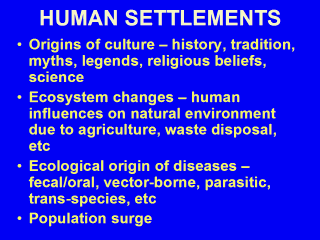 |
The secure food
supply led to the first great population surge. Little settlements became
villages, which became towns, towns grew into cities. Before long,
civilizations with religions, laws, history, customs, traditions, and
sciences, arose on fertile plains beside great rivers in Egypt, the Middle
East, India and China. Our ancestors had begun to climb the long road to
health, towards our present situation. (We might ask, as we consider the
wars, the suffering, the injustices of the world of the early 21st century,
"Where did we take a wrong turn?" But thatís a story I neither have time,
nor am professionally equipped to tell adequately).
As humans grew fruitful and multiplied, so did the variety and number of
their diseases. Permanent human settlements transformed ecosystems, and
abiding by epidemic theory, the probability of respiratory and faecal-oral
transmission of infection rose as population density increased. Ecological
and evolutionary changes in micro-organisms account for the origins of
diarrhea, measles, malaria, smallpox, plague, and many other diseases.
Micro-organisms evolve rapidly because of their brief generation time and
prolific reproduction rates. Many that previously had lived in symbiosis
with animals began to invade humans where they became pathogenic. Some
evolved complex life cycles involving several host species, humans and other
mammals, humans and arthropods, humans and freshwater snails.
These evolutionary changes in host-parasite relationships occurred at
least several millennia before we had written histories. Our oldest written
records that have a bearing on health date back about 4000 years. The Code
of Hammurabi (c. 2000 BCE) contains ideas indicative of insight into the
effects on health of diet and behaviour. It also suggests rewards and
punishments for physicians who did their jobs well or poorly. |
